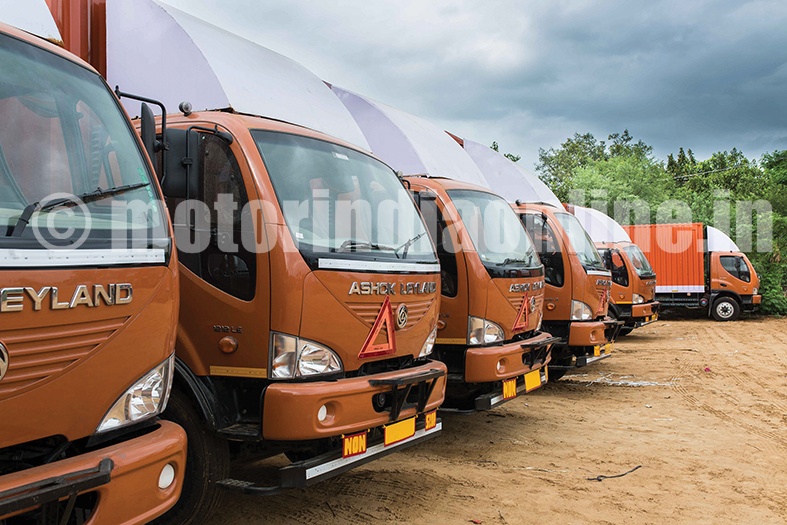Keen on bringing freight and internet together
When Deepak Garg decided to let go his corporate job and get his hands dirty in the highly unorganized and fragmented trucking industry, he knew he had to solve real problems – lack of drivers and information about new areas, return loads and on-time deliveries as well as availability of transporters. About two years later, his start-up Rivigo has already emerged as India’s largest technology-enabled logistics company and a notable leader in the logistics sector. With unparalleled delivery times and a unique process that drastically improves the life of the drivers as never before, Rivigo is redefining the way trucks are operated.

MOTORINDIA ferrets out the details from the Founder and CEO of Rivigo in an exclusive interaction at his office.
Edited excerpts:
Can you run us through the genesis of Rivigo? What prompted you to get into the domestic surface transport industry?
Prior to Rivigo, I was with Mckinsey for eight-and-a-half years and have worked across the globe. I was a leader in the operations practice and used to serve a lot of clients in the logistics and supply chain space. One-and-a-half years back (in 2014) I began thinking about quitting my job and starting something of my own, and was exploring multiple avenues to get into. Since I was familiar with the logistics industry, I thought this was an area that made sense for me to get into.
This industry, which is quite large, is plagued by myriad problems like poor truck efficiency, driver lifestyle and delay in shipment, to name a few. On top of it, the clients or users of the logistics industry are faced with the problem of lack of high quality services. The stakeholders, comprising transport operators, OEMs, logistics firms and truck drivers, were not happy because of the gaps in the ecosystem. We realised that technology can be used effectively to come up with solutions to plug these gaps.
One of the biggest problems of this sector is driver availability. If the driver works in a healthy and disciplined fashion, the entire value chain benefits. Not only the client will get the service on time, the truck operator can expect higher efficiency from the vehicle which will ultimately help clients get better service and OEMs develop higher quality relevant product.
What are the key USPs of your business model vis-à-vis the other logistics players in the industry?
There are three USPs in our business model. The first one, of course, is that there is high quality service for any customer working with us. This is coupled by a lower turnaround time, higher predictability and reliability of logistics that we provide through our relay pit stop network. Secondly, through technology we provide visibility of shipment of the products. We enable higher reliability by predicting failures and doing higher quality maintenance programmes on our fleet. Thirdly, we take along the entire ecosystem, particularly the drivers who are the most vital element, and provide them a better environment to work in. This enables us to provide a holistic and superior quality services platform to our customers.
The company’s operational processes, advanced technology, trained and professional staff help its clients manage long-haul logistics seamlessly. Using its technology and operational processes, the company co-ordinates delivery of trucks between cities.
Enhancing truck drivers’ efficiency has been a pressing need of the transporter industry. So what were the strategies that you have charted out to address it?
Our primary thesis was that we will fall short of truck drivers in a huge quantity. As a country, we need a million truck drivers every year, which is the second largest skill gap. One of the harsh realities is that the youth of the country do not want to be truck drivers. The reasons are many, like lack of dignity of labour, poor working conditions, no social life and recurrent harassments on the roads. Moreover, they are not respected in the society. So the bottomline is that for them it is not an aspirational job, and we are doing our utmost to resolve some of the burning issues. So we deliberated on how to convert these poor lifestyle ‘25 days away a month job’ into a ‘day job’. And that is how we started working on the ‘Driver Relay Model’ wherein we change over the drivers after every few hundred kms. When we do the relay of the drivers, they come back home the same day. This has been made possible because when they go a few hundred km to one direction, they roster back home the same day. So the truck keeps running. This improves the turnaround time and service levels. As a result, the goods reach faster and more efficiently and there is a proper utilization (of the truck). Apart from ensuring the safety of the driver, the quality of the service also improves in this industry.
So do you think such steps will change the dynamics of the domestic logistics industry?
Absolutely! When the driver is managed well, the entire value chain benefits. If this model scales up, the supply chain can get much more responsive. For example, from eight days earlier (by other logistics players) it takes us just two days for the goods to be taken from Delhi to Chennai. This ensures there is a huge cutback in inventory costs and that makes the entire supply chain leaner. Companies which were transporting their emergency goods by air or rail earlier can now take to surface transport at nominal costs. As a consequence, the trucking or logistical network becomes much more reliable now and many customers are much benefited now. They can work on their month-end shipments much later and can get higher quality market access and can reduce their inventory costs. They can serve their customers better. There are many advantages that this service can have for customers.
Rivigo has reportedly bought 100-odd trucks from a leading OEM recently. Would you like to confirm the development? If yes, can you run us through it?
Yes, that is correct. We have bought single-axle ‘Boss’ and multi-axle ‘2516’ trucks, and both of them account for 50 per cent of our 100-fleet order. Currently, we have a fleet size of around 800 trucks with a major chunk of them sourced from Ashok Leyland. More than the products, the service requirements are very high in our business model. The uptime requirement, responsiveness and high quality services are very essential to meet our clients’ expectations. If we commit a two-day delivery, it should be done within that timeframe. This means we have to tie up with a reliable (OEM) who will invest in building that high quality service network involving roadside assistance, higher vehicle uptime, etc.
What prompted you to go for bulk orders when the economy is not yet out of the woods?
We believe that our services are quite unique and are able to create a lot of value for our clients. With our unique business model, our services and offerings are bound to grow. We are catering to all the sectors of the economy such as automotive, FMCG, pharmaceutical, retail, e-commerce, cold chain, apparel, lifestyle and other industries. We are betting big on e-commerce and cold chain industries which are witnessing an unprecedented growth. Additionally, if the GST comes through, then time sensitive and high quality services like ours will gain ground with customers as they will consolidate warehouses and move to direct deliveries from centralised warehouses and plants.
Will you be ramping up your fleet size to serve your clients better? If yes, will you be sourcing from other truck makers too?
Yes, on both fronts. We keep adding our fleet based on the orders that we receive from our customers. So far our relationship with Ashok Leyland has been very good. We may buy trucks from other OEMs too if any such opportunity arises. We are already in talks with some players and are currently doing some pilot runs with them. It all boils down to the service support that they (OEMs) will provide us.
Will you be looking to outsource your services to transport operators?
We are open to that option as well. We may tie up with fleet operators who are keen to use the Rivigo platform that we have built pan-India. We will be enabling these operators with the relay model on our platform.
Lastly, what is your vision for the company?
Rivigo’s mission is to continuously innovate logistics to make it simple, efficient, safe and sustainable.
